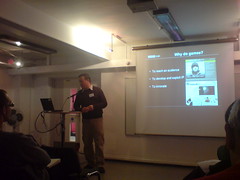London Games Festival Fringe: Jamie Cason of the BBC
Advising programme makers about how they can exploit the programmes the BBC makes: "360 degree commissioning". Television is where all the budget is, then radio, then games and interactivity.
Early on in FictionLab, Tom Dolan said "all interactive fiction is indistinguishable from a game". What sort of games is it appropriate for the BBC to be making? Games at the BBC have mainly been spin-offs from TV shows. Now they want to develop original IP.
Jamie Kane - an alternative reality game about a missing, presumed dead, pop star. Through the game you talk to folks online, find web sites with clues as to what happened to Jamie. 40,000 people played that online so far.
It's hard to advocate this stuff to people.
Shows off Wannabes (worked on with Illumina), where you build relationships with individual characters, as the show progresses your choices affect what the individual characters think of you. It's about co-opting tiny slices of time that folks have during the day (very "casual television").
What worries the BBC? Spoofing stuff (e.g. in the Jamie Kane case, they were pretending not to be the BBC); legality (copyright etc); age suitability.
Talked about Spooks, Celebdaq, etc. What is a public service game? Is this something the BBC should be doing? How does this affect their relationships with the commercial sector? They don't have a free way to get onto platforms like PS3, etc. - though now these consoles are getting networked this may change.
They've done some stuff on mobile, "more or less successfully", for Spooks. You might see a LARP from the BBC - events in a physical space. Mentions Cruel to be Kind at the Come out and Play festival.
Question: "Some people argue that there aren't any true interactive narratives, that they're all really predetermined. Are the BBC playing with formats where the player contributes to the structure of the game?"
Answer: "No. What we're trying to do is very simple and appeal to the 'casual' market".
